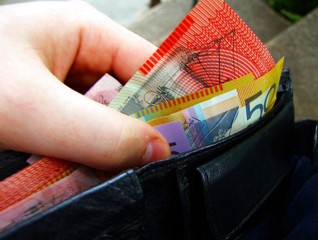Australian farms up for grabs - China's Government buyers

The Chinese Government is buying Australian farms to directly feed its population. Farm buy-ups were not referred to the FIRB unless they were worth more than $320 million! So, unless the farm property is under this amount, it just becomes "international" land! Unease about global food shortages in the next 20 years - and long term agricultural market opportunities - have made Australia and areas of South America prized targets for foreign government-aided enterprises and private investor groups.“Racism” is justified sometimes
Now is the time for some real and justified "racism"!
The Chinese Government is buying Australian farms to directly feed its population.
The purchases are not monitored by the Foreign Investment Review Board, according to Senator Bill Heffernan. Farm buy-ups were not referred to the FIRB unless they were worth more than $320 million! So, unless the farm property is under this amount, it just becomes "international" land!
The highest bidder should be scrutinised! Any agents for the Chinese government or nationals should be rejected.

Just how many farms are worth more than $320 million anyway? What about our food security in the face of climate change threats, which Kevin Rudd has dismissed?
In March, 2009, visitors on temporary visas, such as business owners and foreign students, were allowed to purchase any home to live in, land to build on or new dwellings for investment purposes.
The change saw Chinese money in particular being poured into blue-ribbon Melbourne real estate, as both a way of safeguarding wealth and advancing hopes of migration. Suburbs such as Elwood, Hawthorn and Caulfield North all returned to the $1 million median price club and experienced quarterly growth in excess of 20 per cent. Although the Government announced in April this year that it would adopt a more stringent approval process, experts claim the latest changes will have little effect on the market. Opposition finance spokesman Joe Hockey said it was clear that foreign investment was having an upward impact on housing prices. The same will happen with farming land prices, and food!
China land grabs
Unease about global food shortages in the next 20 years - and long term agricultural market opportunities - have made Australia and areas of South America prized targets for foreign government-aided enterprises and private investor groups.
Africa has also been the focus of a significant land grab, particularly by overseas government-owned investment corporations from China and the Middle East.
So far there were only anecdotal reports of Chinese agricultural investment but Senator Heffernan quoted research by Professor Zhangyue Zhou of the School of Business at Townsville's James Cook University. He believes the produce would be sent back to China from farms now being purchased.
There are reports of significant Chinese interest in Tasmanian dairy farms. The Chinese would never allow this in their own market!
Japan
The key focus of foreign investment has been China in the past two years, but direct investment from Japan to Australia hit $36 billion in 2008, up more than 50 per on 2006 levels, and is predicted to keep growing. A table of Australian acquisitions by Japanese companies compiled by law firm Blake Dawson lists 25 major plays since the start of 2007, totalling almost $18bn.
The two largest investments were Japanese brewing giant Kirin's takeovers of Lion Nathan ($3.3bn) and National Foods ($2.9bn). (The irony is not lost that our "National Foods" is not owned by our own nation!)
Others in this sector included Asahi's takeover of Schweppes and Suntory's takeover of Frucor.
Corporate heavyweight Mitsui paid $100 million for a 49 per cent stake in Australia's fourth uranium mine. Mitsui also owns the Bald Hills wind farm in Victoria. They are not likely to be concerned about losing Australian wildlife, like the Orange-bellied parrot!
India
In the 1970s, India dramatically increased food production, finally allowing this giant country to feed itself. But government efforts to continue that miracle by encouraging farmers to use fertilisers have backfired, forcing the country to expand its reliance on imported food. The overuse of one type - urea - is so degrading the soil that yields on some crops are falling and import levels are rising.
In Western Australia we've got an Indian-government backed company planning to build a fertiliser plant which will be committed, as part of its financial arrangements, to sending 90pc of its production back to India.
In 2006 India invested $2.2 billion in Australia, up from $1.1 billion in 2005.
Hindalco Minerals, a subsidiary of giant Indian conglomerate Aditya Birla, bought Western Australian copper miner Western Minerals. Aditya Birla Minerals Limited is now listed on the Australian stock market.
Another Indian group, Bhushan Steel, holds a 10 per cent stake and a board seat on Queensland coal miner Bowen Energy.
The difference is that the Indian companies are privately owned while the Chinese investors have a much more opaque relationship with China's government.
Lack of patriotism
This is a direct result of Australians not sticking up for Australians. It is high time we had a more nationalistic agenda. If farms are being sold 'cheap' it is all thanks to the ALP in various states, devaluing the farmers hard work and assets. Add to the fact the total lack of reliable services in rural areas, like water, electricity and health hardly attracts people to the bush. The Chinese take, take, take from the Australians thanks to our weak leaders like Kevin Rudd and now its just like that old adage....give them an inch and they'll take a mile.
The irony is that thousands of farmers are walking off the land, due to financial difficulty because they cannot compete with cheap imported food, so the Chinese buy up our land grow huge amounts of food, ship it off to China and most likely export it back to Australia and in turn more Australian farmers walk off their land and most likely sell it to the Chinese again.
For the first time in history we have a Chinese-Mandarin speaking Prime Minister more focused on helping China's growth and food security than actually helping Australia! Ironically, farmers are also being forced to sell their land due to sky-rocketing rates to make land available for property developers.
Wildlife
'Modern' Australia has the worst record in the world for species extinction. According to the International Union for the Conservation of Nature, there are more endangered plants and animals in Australia than most of the rest of the world. Records of recently extinct species in Asia show 71 species that have disappeared in the wild. Examples include the Yunnan lake newt (Cynops wolterstorffi) from China, the Bonin thrush (Zoothera terrestris) from Japan, or the redtailed black shark (Epalzeorhynchos bicolor) from Thailand. They are hardly going to have any concern about our so-called "pest" Australian native species!
Looming food crisis
We need to increase food output by 70 per cent by 2050 to meet the global food crisis. There needs to be money for helping farmers to adapt and manage climate change, and for meaningful water initiatives.
Professor Cribb, Science writer and former head of CSIRO media, told a recent Senate enquiry in Canberra that the United Nations Food and Agriculture Organisation last year revealed investments in the order of $80 billion a year in agriculture were needed to help meet the needs of a global food challenge. By 2050 there will be about 10 billion people on the planet to feed!
We seriously lack patriotism and vision in Australia and we are too willing to the highest bidder - something we will regret! It is time the taboo on "racism" be lifted to protect Australian interests.
Our future?
Population growth is being used as an industry to keep our economy strong through building up the property markets. What happens when all our mining resources finally run out? With almost no manufacturing sector, all our farms foreign-owned, will we turn into a third-world economy overnight.
China will have a perfect pretext to attack and invade Australia in order to allegedly protect its legally purchased acquisitions and the Chinese people who now own them.
Why spend so much on Defence when the potential enemy is already invading by stealth? Australia will become an economic subset of China and Chinese citizens will be given unlimited access to move to Australia to look after their interests and eventually, if Chinese buy even more Australian assets, and they have the money to do so, what is to stop Australia will becoming a Chinese province?

Recent comments